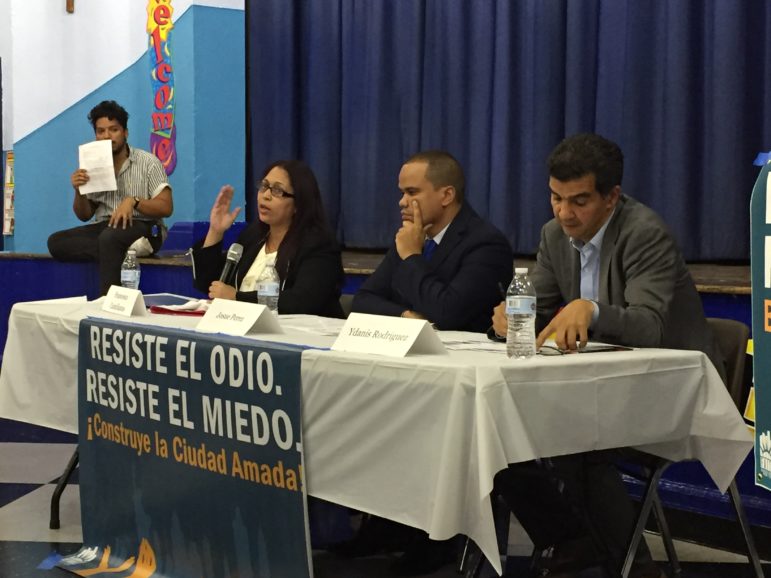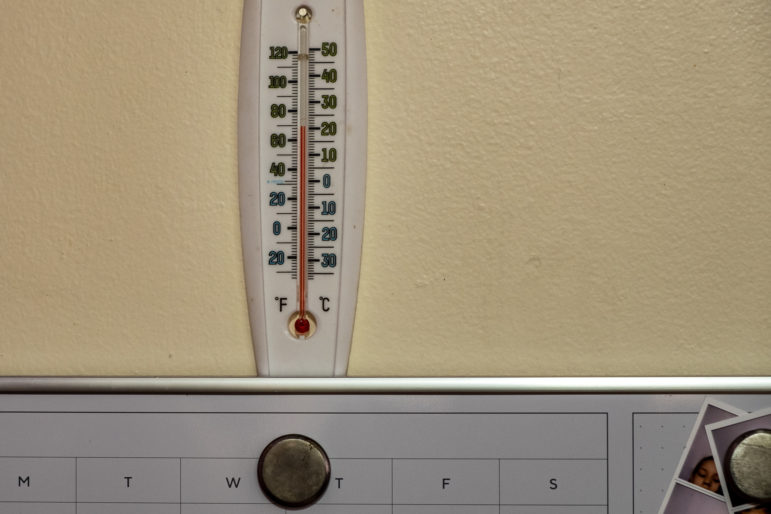
Abigail Savitch-Lew
The candidates, from left to right: Francesca Castellanos, Josue Perez and two-term incumbent Ydanis Rodriguez, who is also running for City Council speaker.
The forum itself was non-partisan: hosted by Faith in New York, the Friday night candidate debate for District 10 featured song and poetry, spoken-word and prayer, and fair-minded questions from moderators who aimed to give each candidate equal spotlight. But the large crowd that attended was clearly divided from the beginning—with supporters of the candidates embittered by the disagreements that have unraveled over the last year and offering loud applause for their pick.
On the ballot is two-term incumbent Ydanis Rodriguez, who is also running for City Council speaker and was previously a teacher; Josue Perez, a teacher at the Theodore Roosevelt campus and founder of a community services organization; and Francesca Castellanos, an interpreter who has worked in various occupations including as a case manager for the Human Resource Administration and as a tenants’ rights specialist. She has not raised any money in the race.
Rodriguez won his last election with almost 85 percent of the vote, but in recent years tensions have grown relating to a neighborhood rezoning effort lead by the Economic Development Corporation in partnership with Rodriguez. That rezoning would include both a large contextual rezoning, to preserve the character of certain blocks, and an upzoning in other places to promote housing growth, including a portion that is income-targeted. Tuesday’s primary is almost literally on the eve of a major event in the timeline of the Inwood rezoning proposal: On Thursday, the neighborhood will attend the first official hearing on the plan.
Housing and zoning
The question of displacement and development came up multiple times on Friday. In the first round of the debate, candidates were asked to identify the root cause of the affordability crisis and what they would do to protect tenants from displacement.
Rodriguez’s opening comments stressed his working-class immigrant roots; he said he’d arrived in the country in 1983 to wash dishes and said all his life he’d “been fighting very hard to make sure that his family had the right to stay here to live in Inwood.” He said he was working to combat the warehousing of empty buildings, delivered significant funding annually to the Lower Manhattan Improvement Corporation to fight for tenants’ rights, brought a Legal Services NYC office to Inwood, and stood up against the Bloomberg administration to defend neglected tenants.
Later, addressing the rezoning, Rodriguez emphasized that dialogue would continue and that nothing was a done deal. “We have to listen to other voices, other suggestions, but the fact [is] that the proposal that we are discussing today related to rezoning is a contextual rezoning. It will not touch anything to the west of Broadway [and] is only focusing mainly in the manufacturing area that is in the east of 10th Avenue,” he said.
(The city’s plan does include some upzoning in the corridors west of 10th avenue, including Broadway, 207th Street and Dyckman Street.)
“Can we learn from other rezoning processes? Can we do a rezoning where we build affordable housing for our working class based on the median income?” Rodriguez added, noting that there are people living on Social Security Income. “My responsibility as a councilmember is to listen to your voices, to your ideas, and to make this rezoning in this community the best it can [be], so that we don’t push our working class out of the neighborhood.”
Perez, who has made opposition to the rezoning a central theme of his campaign, declared that the root cause of the affordability crisis was politicians taking money from landlords and developers, and vowed “we’re not going to take a single penny from an abusive landlord.” He said he’d conduct real tenant outreach so they’d know their rights and work collaboratively with non-profits, among other efforts.
Later, Perez said the rezoning as currently planned would both cause displacement and affect quality of life by overpopulating the neighborhood. He called for 50 percent permanent affordable housing, especially housing for families making about $32,000 for a family of three, laws to protect small businesses, ending rent increases in rent-stabilized apartments for Major Capital Improvements (though as Rodriguez pointed out, only the state can do that) and more community involvement, especially from groups like Northern Manhattan Is Not For Sale, a coalition of groups fighting the rezoning.
“It’s not that we’re all against rezoning…We have to make sure we have the ground, the basis for development,” he said. “Do we have the infrastructure to support this upzoning?”
Castellanos said the root cause of the housing crisis was lack of accountability from agencies like the Department of Housing Preservation and Development (HPD), which she accused of not enforcing the housing code. Later, she called for laws to prevent warehousing, rent stabilization for local businesses, that “the charter” must be amended “so that people in the community can have more of a voice,” and better support for residents of Tenant Interim Lease buildings. She accused Rodriguez of “passing the buck” when he pointed out that only the state can change the regulations governing rent-stabilized apartments, and she too spoke of real-estate money in politics. “Our elected officials are not informing you that they’re taking money from a lot of the developers so that they can change a lot of these rezoning laws to benefit the developers,” she said.
(City Limits conducted its own study of campaign donations using real estate related search terms and found Rodriguez had received more real estate donations than some candidates in rezoning neighborhoods, but less than others. Perez had received far less, but not nothing, from the real-estate industry.)
The Inwood library
The candidates also discussed the city’s plan to redevelop the Inwood library with 100 percent affordable housing and a new library. It remains unclear to the community whether there will be a temporary replacement for the library while it is closed for construction, and the group Save Inwood Library has been circulating a petition calling on Rodriguez “to oppose the proposed Inwood Library/Housing project that would result in the demolition of the Inwood library.”
The petition does mention the plan to build a new library, although it does not emphasize it. Rodriguez twice criticized the group’s petition for creating what he said was a false impression. “That’s misleading the community and using the fear of our community…There’s not a plan to close the library. There’s a plan to build a state-of-the-art library,” he said, arguing it would be more productive to be discussing what kind of services ought to be offered in the new library, and insisting there would indeed be a temporary library. (He told City Limits after the meeting that it was the New York Public Library’s responsibility to come up with a temporary site, and he promised before there was any closing of the library there would be a plan for temporary services.)
But Perez said the community could not trust that there would be a replacement site, “so we’re simply going to say no.” He added that if the library was redeveloped it would need to truly be better than what the neighborhood currently has. Castellenos agreed, arguing “we can have a state of the art library without us having to close the library” and that “we cannot allow to have this library close without first having a plan for another library being built in our community.”
Policing, environmental justice, transportation
The candidates had some similar but also some differing ideas when it came to issues other than development.
Noting two different kinds of policing issues—racial disparities in policing, and inadequate response to quality-of-life complaints like noisy businesses—moderators asked what the candidates would do to improve police community relations.
Rodriguez noted that he’d been arrested by the police multiple times, including during Occupy Wall Street when he sued the NYPD for manhandling him and donated his compensation to the Center for Constitutional Rights, and just this week for protesting Trump’s withdrawal of DACA. He said he’d worked to ensure the NYPD had “all the resources they need” to prevent Inwood from slipping back to the crime-ridden 1980s, and would also continue to work on ensuring the NYPD addressed quality-of-life concerns.
Perez also said police need more training in cultural awareness, that the Right to Know Act should be passed, and that there needed to be a proper system established for the use of police body cameras, among other ideas.
Castellenos, noting that she belongs to her precinct’s community council, said she’d increase dialogue between the community and police, make sure the police are well-trained about the diverse communities they serve, and require the NYPD to provide regular updates about 911 and 311 calls. “It’s like a husband and wife relationship. We need our officers to protect us and not abuse us,” she said.
Asked to address how they would further environmental justice in the neighborhood, Perez called for improved access to fresh food, more health education classes, more funding to improve local train stations, and passage of the Asthma Free Housing Act. He said Rodriguez and other elected officials had failed to help his school get portable drinking water, and vowed to “fight to make sure that we get quality and healthy food in our district.”
Perez, for his part, said the MTA had a lot of funding and that also he’d fight whoever it is, mayor or governor, to get funding for the transportation system. He again took it back to the rezoning, saying there couldn’t be additional housing until the subway system was fixed.
Castellenos talked about creating legislation to make sure there was “no rezoning of our natural resources,” that there were more green buildings, community gardens, and education about healthy eating. She also repeatedly stressed the importance of making sure outsiders weren’t making decisions for Inwood residents. Castellenos said she supported bike lines but was also concerned about creating congestion. She said people needed to prepare themselves for the fact that repairing the subway system would also come with inconveniences.
Rodriguez touted multiple recent investments made in neighborhood parks, including over $30 million to Highbridge Park. He said Perez “worked in a school that I supported every year” and mentioned his car-free days, which involve closing streets to traffic to enable community activities and promoting climate change awareness.
On transportation, Rodriguez said he’d been recognized as one of the best chairs of the committee on transportation in the City Council’s history; he’s been at the forefront of the City Council’s dialogue with the MTA over the subway system. He also said he wanted a ferry stop to the area, that he was working to bring more Select Bus Service to the neighborhood, and that he’s been advocating for a shuttle train to connect lines that cross Inwood like the 4, D, 1, and A.
The discussion of Inwood’s future continues this weekend, as well. Northern Manhattan Is Not For Sale is hosting a march this Sunday to voice opposition to the proposed Inwood rezoning and redevelopment plan for the library. The group will call for funding to come up with a community-based rezoning plan and for support for a new initiative, the North Manhattan Community Land Trust.








One thought on “At Heated Inwood Debate, Rezoning Is Central Contention”
For all of the noise that is being made over issues in Inwood, the number of voters in yesterdays election in Inwood was very low. At four, forty pm I was only the 68th voter in my voting area. Community action needs citizens that vote!